Premiering in the Cannes sidebar, Un Certain Regard, where it received a special mention for the best newcomer, Chie Hayakawa's “Plan 75” is a slow-burning drama that pivots on the issue of the rapid-ageing of Japanese society. Set somewhere in the near future, Japan has managed to figure it all out – a titular system enabling to get rid of the elders, through a modus operandi that resembles a modern rendition of “Ballad of Narayama”, albeit as a form of peaceful, quiet, and more importantly, legally authorized by the government euthanasia that is supposed to become a counter-plan for a progressively ageing society. In Hayakawa's reality of Japan, citizens 75 years old and above can apply for their chance and be dismissed in their last trip by one of the Plan 75 Company's guides; with that, they can serve the nation as their final act of compliance.
Hayakawa's “Plan 75” was originally a part of the 2018 omnibus project co-produced by Hirokazu Koreeda, “Ten Years Japan” (an initiative started with Hong Kong's film in 2015, followed by Taiwan and Thailand), in which the upcoming voices from Japan envisioned a potential picture of their country through the socially-daring, genre-fueled, and often extreme narratives, rendering somewhat of the vibe of “Black Mirror” series. Hayakawa's short film had the premise that perhaps had the biggest feature potential – and its vision wasn't that far from the real image, which is to say, the most unfortunate – so it was only a matter of time for the story to pave its way to a feature-length format.
In her feature debut, Hayakawa gazes on the semi-dystopic Japan in a polyphonic manner, encapsulating her narrative through the perspective of four: an older lady Michie, a Filipino nurse, a salaryman working for the Plan 75 and the company's guide who works as a call-center operator. Hayakawa's subtle gaze focuses mostly on capturing the quotidian realms of their lives – their routines, and daily rituals – but then again, the real struggle of embracing the reality in which the safety of an individual is threatened by a dystopic setting.
Hayakawa's Japan seems to be a bit stirred, although its messiness unravels rather implicitly – in some way, the film doesn't tell anything far from what we're used to in Japanese cinema; in fact, it's just another representation of elders being heart-wrenchingly friendly. Immersed in their wholesome approach to their surroundings, they keep on doing their best; and we, as the audience, cherish every moment of our mutual journey that seems to unfold as a lesson of empathy. That said, this is precisely what makes Hayakawa's debut utmost disturbing – and that comes to my mind several days after the screening – it's the peaceful rhythm of her narrative, the idea that it's all perfectly installed in the image of the mundane; that there's no rebellion among anyone is the story of pure cruelty, with no chance of happy ending whatsoever.
On the occasion of the Festival de Cannes, we met with Hayakawa-san to talk about her debut feature. We managed to discuss the process of extending her short film of the same title, rewriting the script, rendering the visual language of “Plan 75”, its social premise and real events that inspired her to make the film, as well as those filmmakers who shaped her sensitivity as an artist and a storyteller.
“Plan 75” screened at Festival de Cannes!
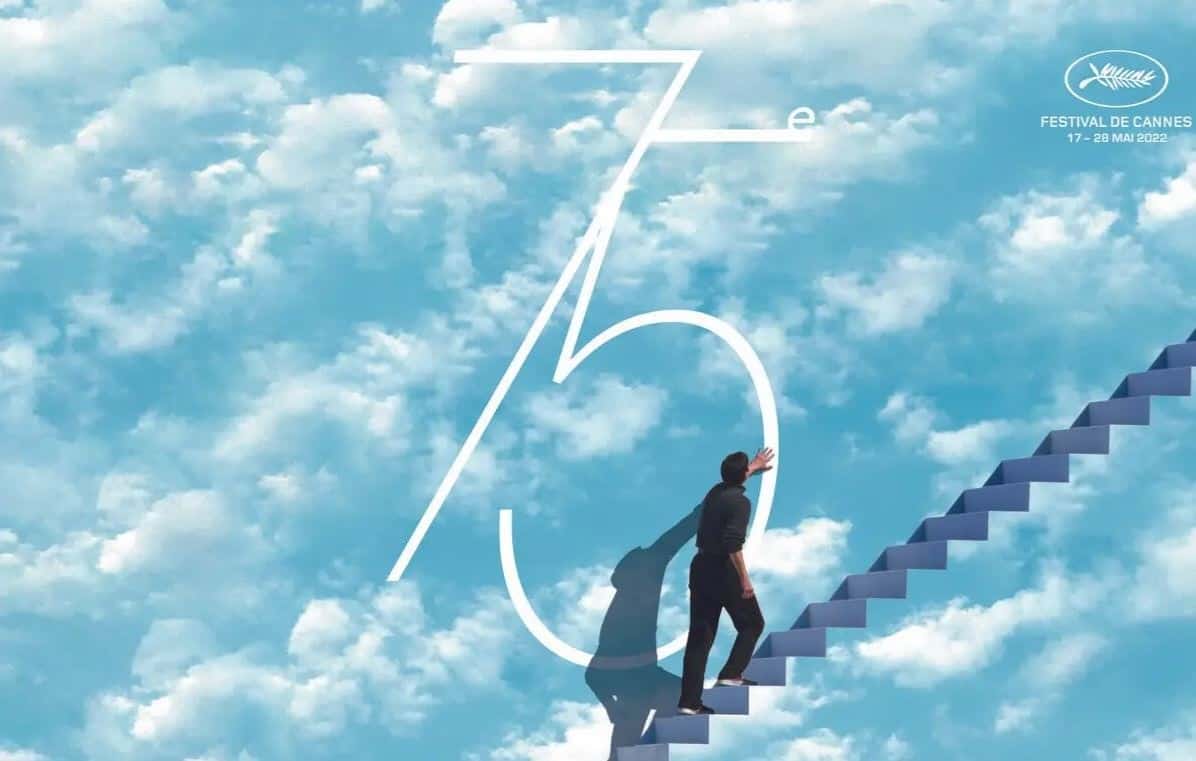
Since the idea for “Plan 75” started with the short that made it to the omnibus project, “Ten Years Japan” (2019), I was wondering what was the process of altering the premise of the whole narrative into a feature-length film?
I guess the most difficult part was working on the script. Even before “Ten Years Japan”, I knew I wanted “Plan 75” to become a feature about the vision of Japan 10 years into the future. The omnibus project was basically a good opportunity to take off – I thought of it as a chance to see what happens next, so I wrote the short version first. My two producers – Jason Gray and Eiko Mizuno Gray – who worked with me on the short film, immediately encouraged me to extend the idea into a feature-length project, so they joined me on this one as well. We started developing it sometime around the end of 2018. I participated in 2019 FEFF Udine's project market, Focus Asia, which enabled me to kick off and focus on rewriting the script.
What became the most difficult part about working on it?
In my short, the vision of the world is constructed in a way it's supposed to make you feel overwhelmingly scared about the controversy of Plan 75. And all of that happens during the span of only 18 minutes. With the feature, we couldn't go on like this. There is a focus on the problematic nature of the plan itself, but when we started to work on the film, we experienced coronavirus. As a result, reality extended fiction, it jumped over our dystopian fantasies and the world entered a very serious state – one that no one anticipated. With pandemics slowly progressing and becoming more and more severe, I started to realize that maybe I need to make a film about the anxiety that the world started to induce. At some point, my film started to be a real struggle for me; I didn't know what was the right path for it. On one side, I thought I want to address these notions of anxiety, but at the same time, I felt that such a pessimistic vision wouldn't be fair, so I decided to balance it with an image of hope. I felt that hope is necessary. And it is; once I reached out for it, it was there.
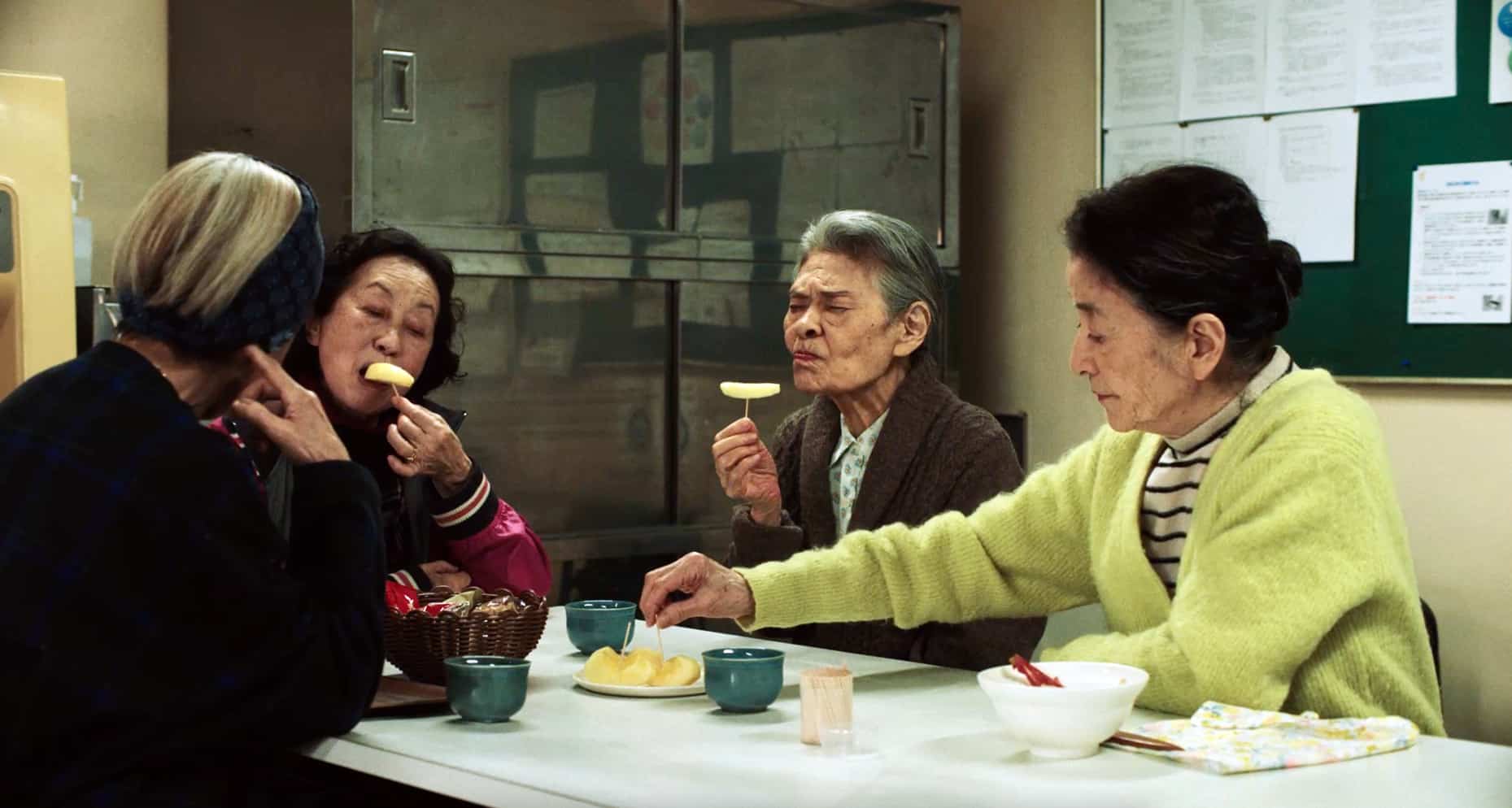
(Festival de Cannes)
And it becomes apparent in your film and its visual layers. When I watched the short, I was stroked by its coldness and very dystopian atmosphere. The feature is way more warm and colourful, evened out in terms of palette, not so bleak, and more layered. How did you approach the transition of cinematic language?
On one side, “Plan 75” reveals an image of gentle, friendly, honest human beings and their kindness. On the other, there is violence. When I started to think about the visual language of my feature film, I wanted to clash this depiction and the best possible way was to render it through this stark contrast – between warm-hearted people, their delicacy, calm faces, warm voices, their peaceful everyday life and this inhuman form of violence that becomes possible and is performed on them as an act of systemic power.
This contrast seems to be also visible in the way you approach lighting and colours in the film. You include natural sunlight – oftentimes resembling the komorebi aesthetics of Naomi Kawase, especially in the finale – that frames the silhouettes of your fragile characters, gazing at it directly; meanwhile warm palette of colours seems to foreground a background for the poetry of quotidian and mundane.
With this film, I wanted to be as much receptive as possible to lighting and sunlight and convey the image in a way it would become memorable thanks to the use of lighting. For me, lighting symbolizes the beauty of our existence; it stands as proof that we are beautifully alive. Since it possesses a symbolic meaning for me, I was hoping to make my audience reflect on the significance of lighting as well. In one scene, we see Michi (Chieko Baisho), the protagonist of my film, gazing directly at the sunlight. I'd like to think of her that in that moment she's embracing all the feelings that come with the joy of living. That's the reason I decided to reflect on the world through lighting and render it as an important and recurring motif.
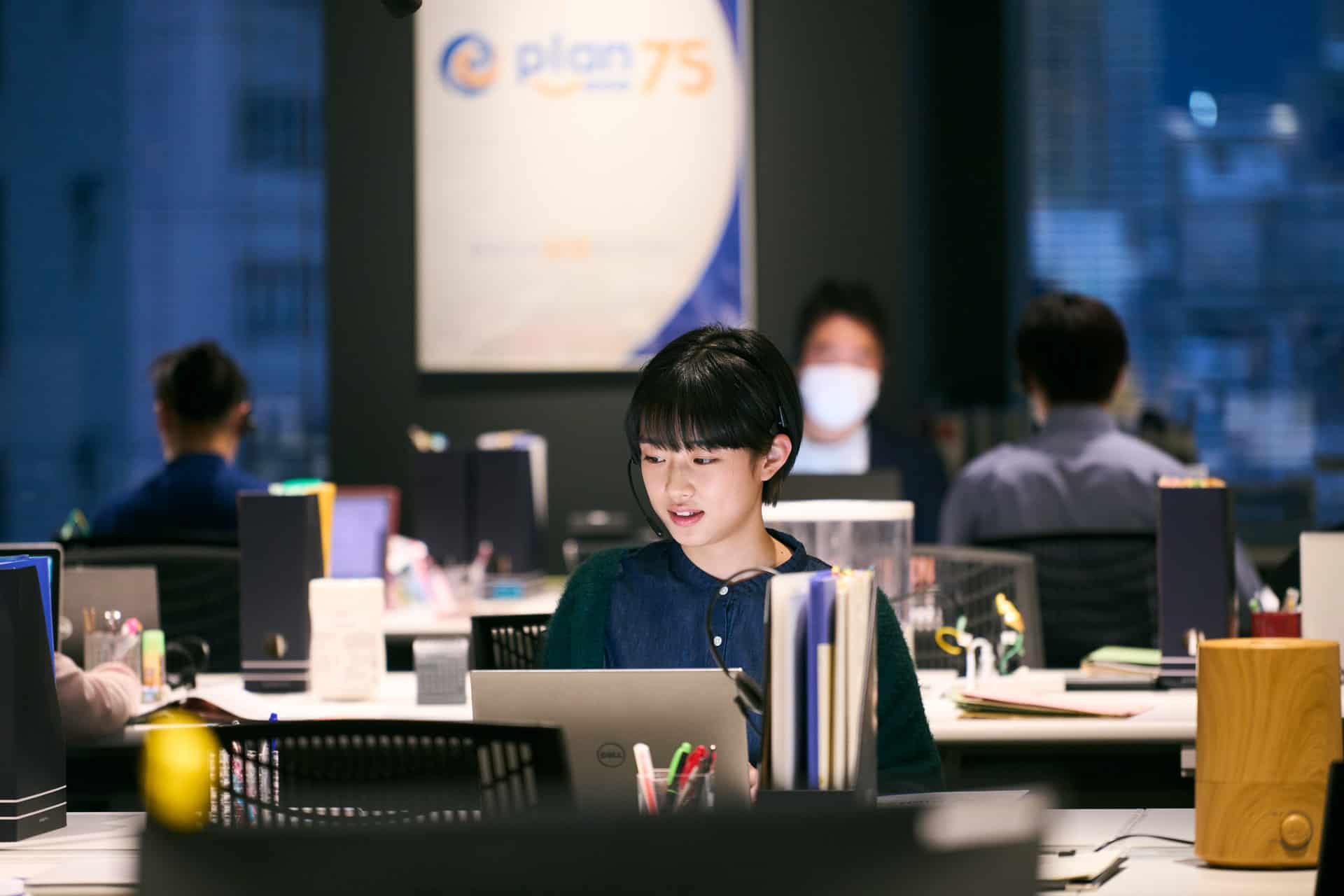
(Festival de Cannes)
Aside from visual motifs, there is also attention to the layer of sounds. After all, many scenes take place through a conversation on the phone. We pay attention to the tone or timbre of voice, rhythm of one speech, and shimmering of one's emotions. It's a world of expressions that seems to be difficult to achieve. How did you prepare the space for sounds?
These scenes – between Michi and Yoko (Kawai Yuumi), a call-center guide working for the Plan 75 company – render a very powerful moment for the whole story, so the right preparation was crucial. I knew for sure that we can't just shoot the scene with two people talking but not seeing each other. Those two places, the call-center and Michi's place, are quite far from each other so we had to shoot one part first and then the other. We covered Michi's parts first, but Kawai Yuumi was there at the site, hidden in the other room, participating in the scene from a distance. Then, the dialogues from the call-center were already matched to the pre-recorded voice of Michi. Our main goal was to maintain the natural flow of conversation and keep the emotional layer of voice adjusted to the real ambience of the scene.
The scene that resembles the style of your short film the most is the first one, which introduces the premise of reality through an act of violence – a young man kills old people and finishes his violent tour-de-force with a voiceover speech and suicide. This in itself is a re-enactment of a real event that took place in 2016 in Japan – I myself remember watching the broadcast of it on Japanese TV. However, aside from the introductory scene, you never reflect on the case. I was wondering, why's that?
The case indeed became a catalyst for both of my films. I started to think about the whole premise of the story after 2016 when a young man burgled into a retirement home and literally committed a rampage. After he was captured, he managed to say a few words on the TV, something that, in fact, stayed with me: “The world doesn't need those who are in some way handicapped or disabled. It's better to kill them. I did it for my nation.” I have a feeling he's not the only one thinking that way – these words are incredibly accurate for the whole Japan, as generally speaking, there's less and less done for the sake of those who are narrated as the weaker ones. And things can escalate very rapidly. Since my film was kind of born out of resentment, I wanted to follow up to the case in the first scene. In a way, Plan 75 is a system that might seem convenient but is also extremely friendly to its ‘users'. However, its very core is basically enrooted in the same way of thinking or principles this young killer had – if there are people who are useless, who don't contribute to society, don't generate any profits, then this very society doesn't need them. It's dehumanizing, but it's there. This very first scene of the film is just a glimpse, but it makes the whole frame of the story more nuanced.
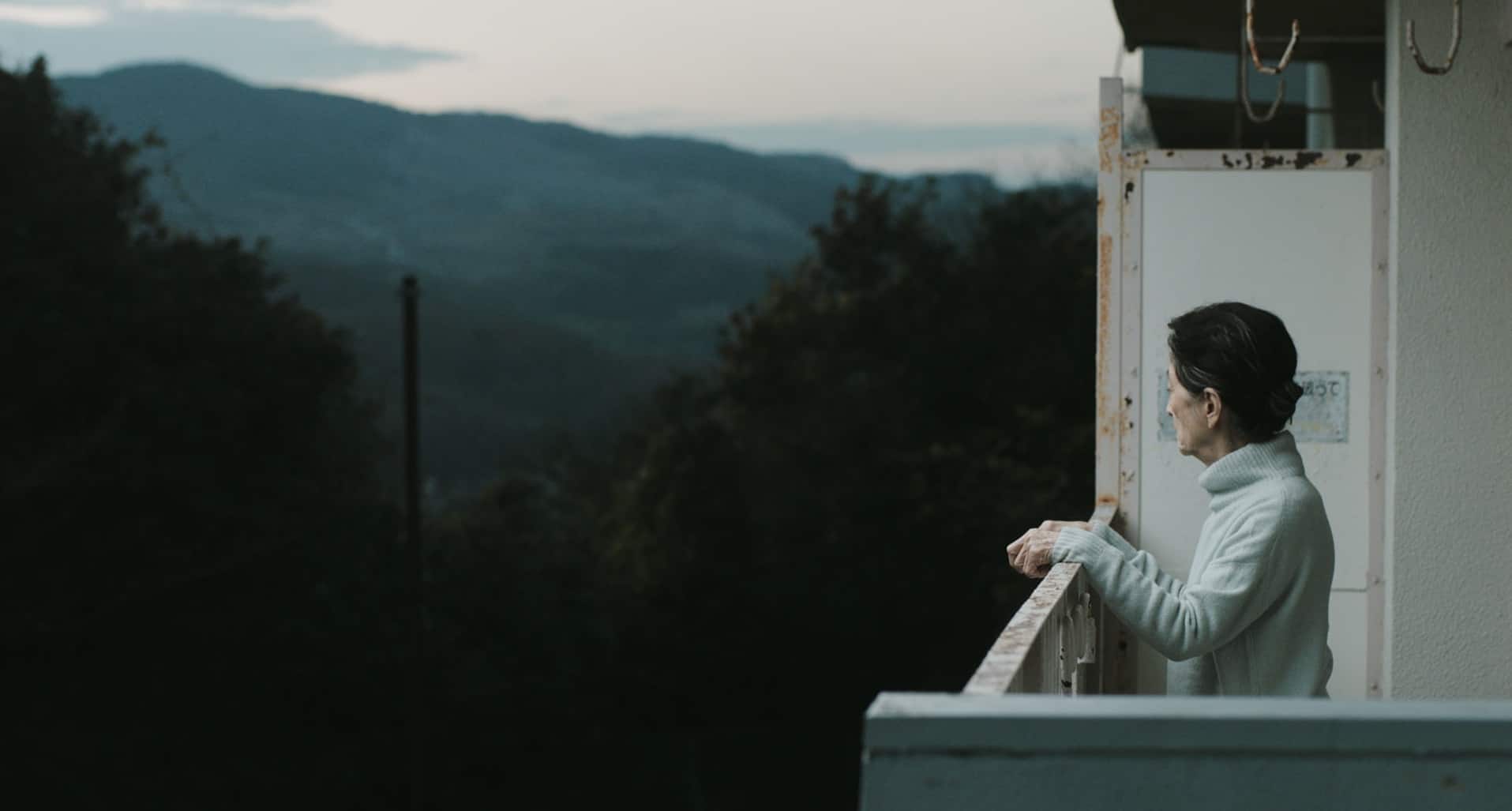
(Festival de Cannes)
In a way, the whole premise of dealing with the ageing population this way derives from the notions of Japanese groupism. I had a similar feeling when I watched your short film, but it came back – this is to say, an uncanny feeling that it somewhat doesn't look that far away from the real picture. Do you think it's possible for such a plan to eventually go live?
Most definitely. Maybe not right away, but in the future, for sure. And that might be even the case that we won't need to wait that long, though. And I'm positive about it because it's based on my observations of our society – I'm terrified of the fact how people live, how we look at things, and how things tend to change in a drastic way. Even though I obviously don't want this fiction to become reality, I made this story as some sort of warning. I'm telling this story precisely for the reason, that I don't want it to become true.
Did you want to critique Japan through this film?
More than critique, I wanted to point to things that are not visible at the first glance: an atmosphere, an attitude, and possibilities that are within our reach.
It might be an obvious connotation, but your film in some way is a modern depiction of the tale of “The Ballad of Narayama”, which also revolved around the re-reading of the dynamics of collective identity. Do you think that modern Japan still has a strong sense of collective consciousness?
I'm absolutely certain of it. It's still very strong. Notions that build into the premise of groupism, like collective consciousness or group pressure, have still a strong presence among Japanese people and this is also the reason why contemporary times are filled with a feeling of danger in the air.
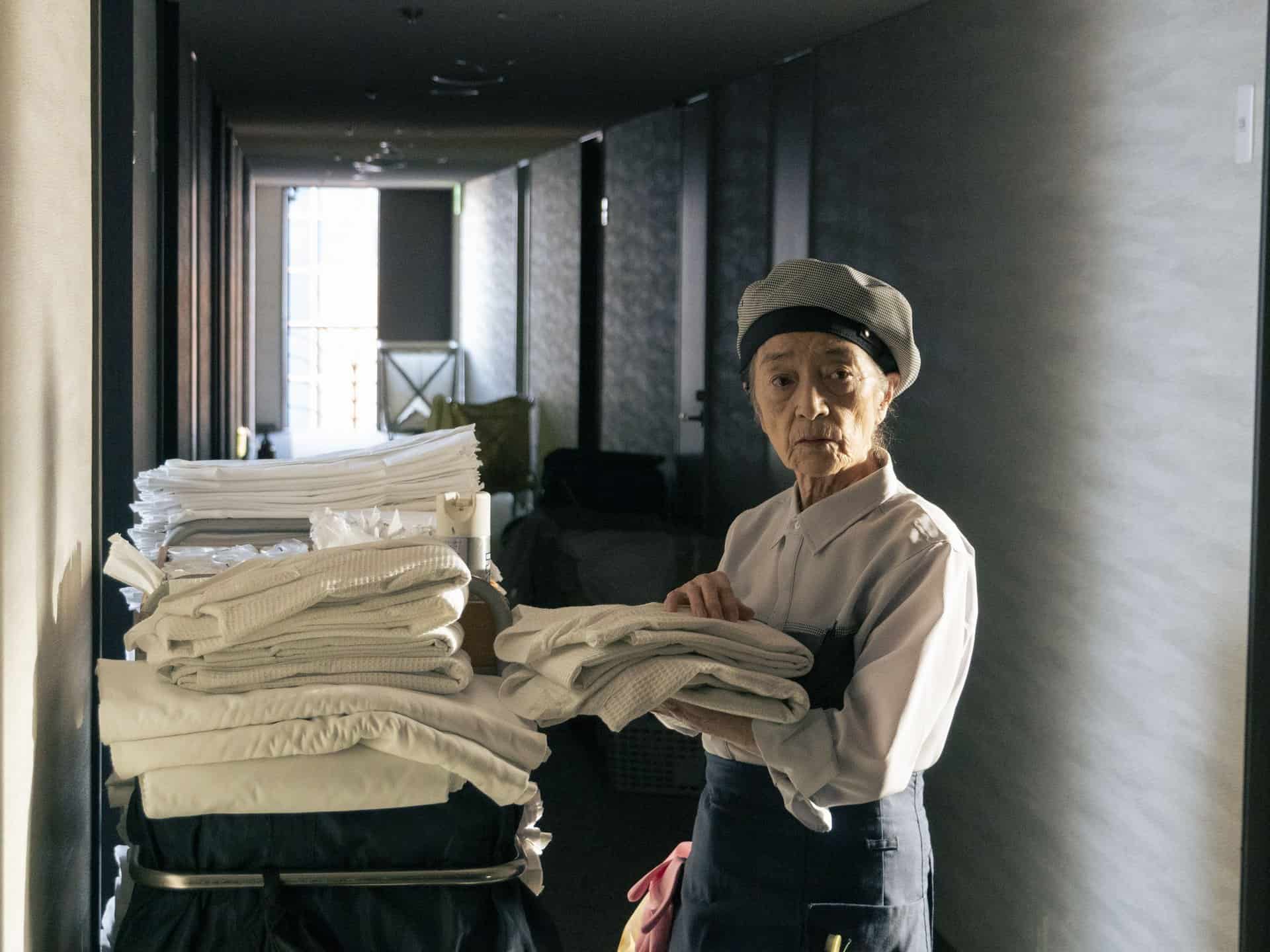
(Festival de Cannes)
Aside from the problem of the ageing population in Japan, you reflect on the situation of immigrants, telling the story through the eyes of a Filipino immigrant. There is a visible shift toward the representation of minorities or the notions of migration in Japanese Cinema and more and more films are getting attention or much-needed space. My question, however, is what has changed that we can now see such representation in Japanese films?
Indeed, something has changed. I guess it comes with the fact that we started to be more conscious of the situation of migrants in Japan. There are also more and more filmmakers who are keen to tell those stories. In the case of my film's protagonist, a Filipino woman working as a nurse, it's not like I wanted to provide an insight into a situation of a laborer struggling in a foreign land, but rather to express the notions of bonds (kizuna) that she has with her family. Therefore, I wanted to focus on her within a certain frame of the community she's surrounded by. She's a very warm and decisive person – she would help someone immediately if needed – but that is something that seems to be connected with her national traits. Thanks to her presence, I could also reflect on another stark contrast – even though we praise our familial bonds, our kizuna, in fact, we seem to be losing it. In other words, we're becoming a very indifferent type of society. If there's a contrast, through which we can look, maybe we can see something in it: that saddening reality of ours, that we're somewhat getting closer to the realms of apathy with each day.
Do you already have an idea for your next project?
As a matter of fact, I do. Again, I intend to lean toward a social lens, with a topic that would revolve around my personal experience. It will be a story of a child, her feelings and her perspective on the world, and it will be based on my childhood memories. I want to make a film that will be very personal.
One of the films that left a mark on you is Kohei Oguri's “Muddy River” (1981), which also depicts the reality of children. I was wondering, though, were there any other films outside of Japan that influenced your sensitivity?
That would be definitely Edward Yang and his “Yi Yi” (2000); or Lee Chang-dong's “Secret Sunshine” (2007). Particularly the latter filmmaker is someone who I'm really looking up to and his gaze at the imagined worlds. I'm also a huge fan of the body of work of Polish director, Krzysztof Kieslowski. I guess he was the filmmaker with whom I cherished my coming-of-age period. Since I was very young when I immersed myself in his work, it had a lot of impact on me back then. Watching his films actually made me realize I want to become a director myself, so I still have lots of admiration for his work.
Kieslowski is an interesting case in terms of influence on Japanese filmmakers. I always wondered, how he managed to render such generational resonance among cinephiles and soon-to-become filmmakers in the 90s.
In my case, it was mostly “The Double Life of Veronique” (1991) that was the formative experience. I was still in high school at the time, so I didn't understand much, but there were so many scenes that stayed with me and resonated with my sensitivity. The whole idea – the feeling of two people being connected without even meeting or seeing each other – seemed complicated but fascinating. It was the first time I came across such a premise, and it became an incredibly memorable experience. I immediately wanted to rewatch the film – and I did, many times – and then I watched “Three Colours” (1993-94), “Dekalog” (2000) or “Blind Chance” (1987). All of these films were somewhat pivotal for me, because I guess they pointed my thoughts to think about the essence of life.


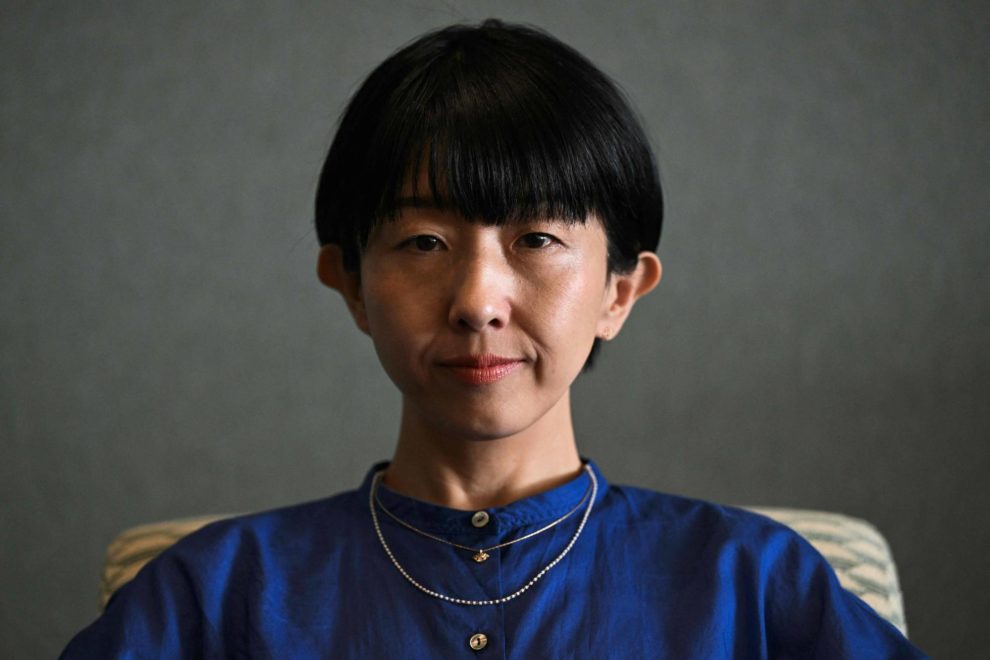


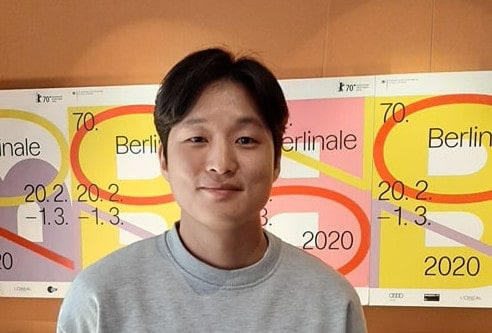

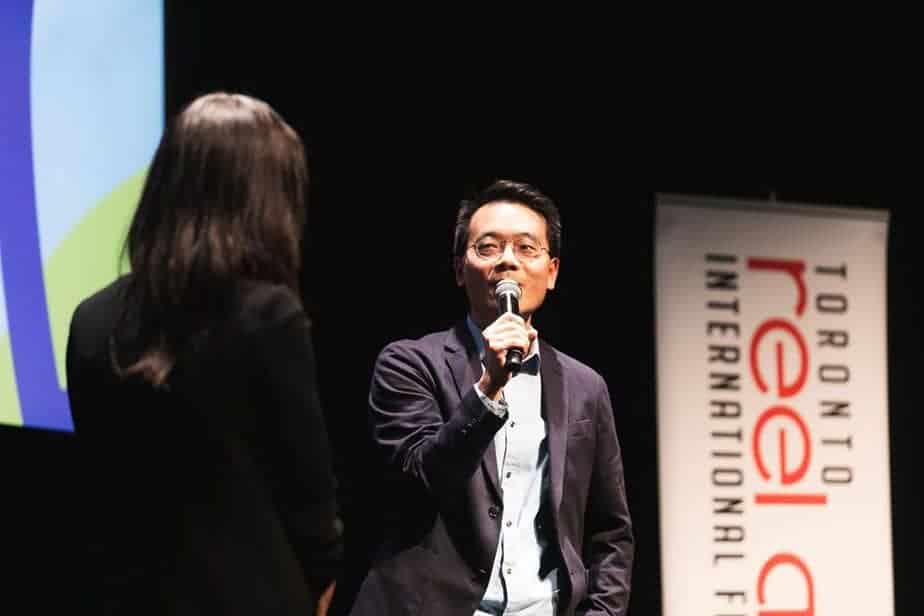
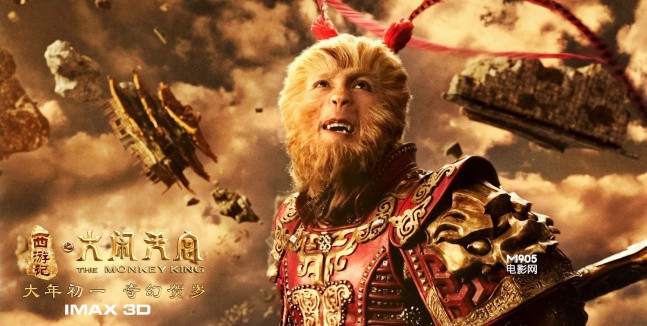
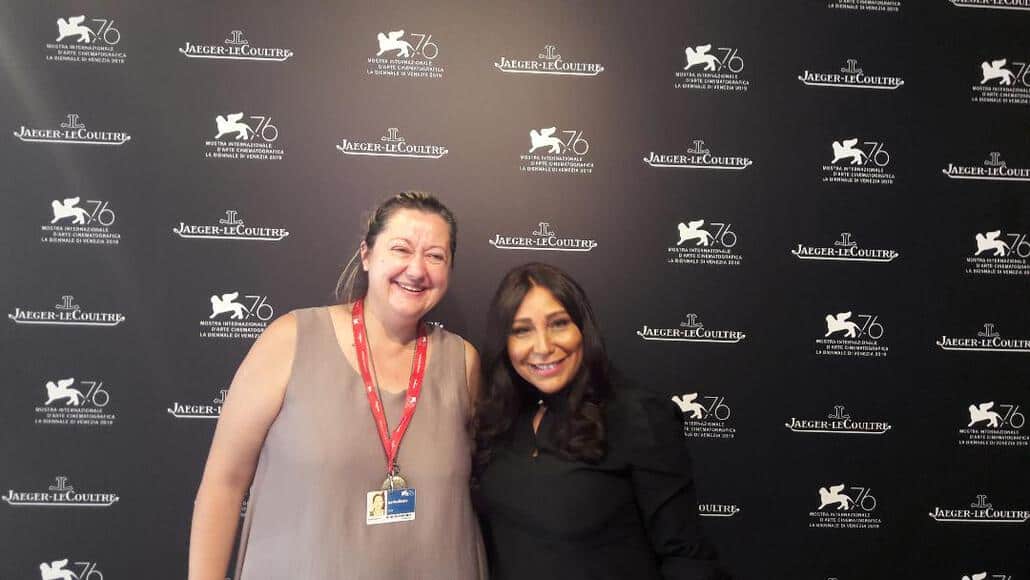
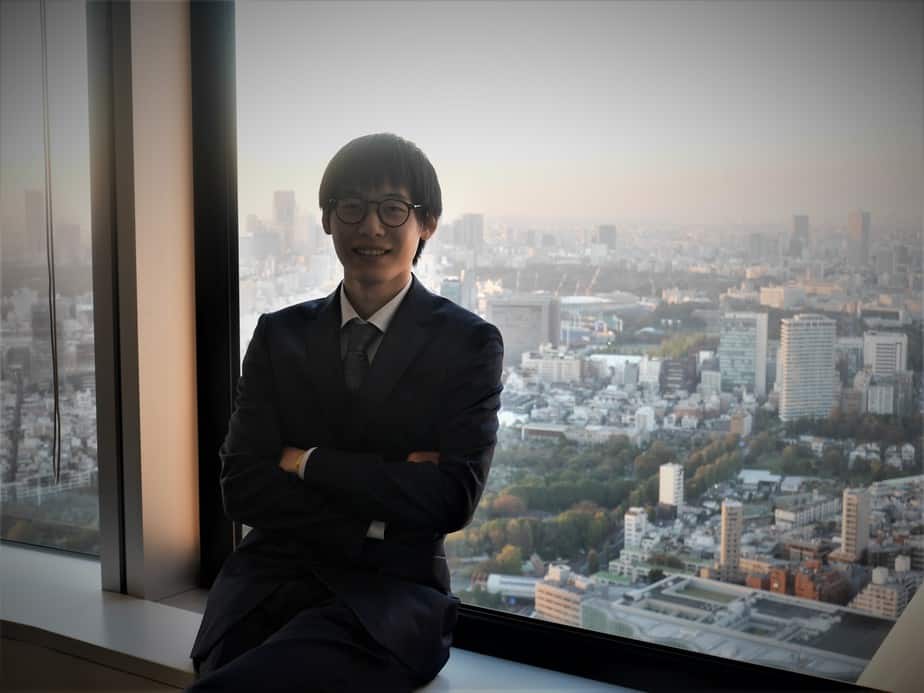







This is beyond cruel. Of course, she is not close to 75 so easy for her to say! I find her deplorable and offensive.